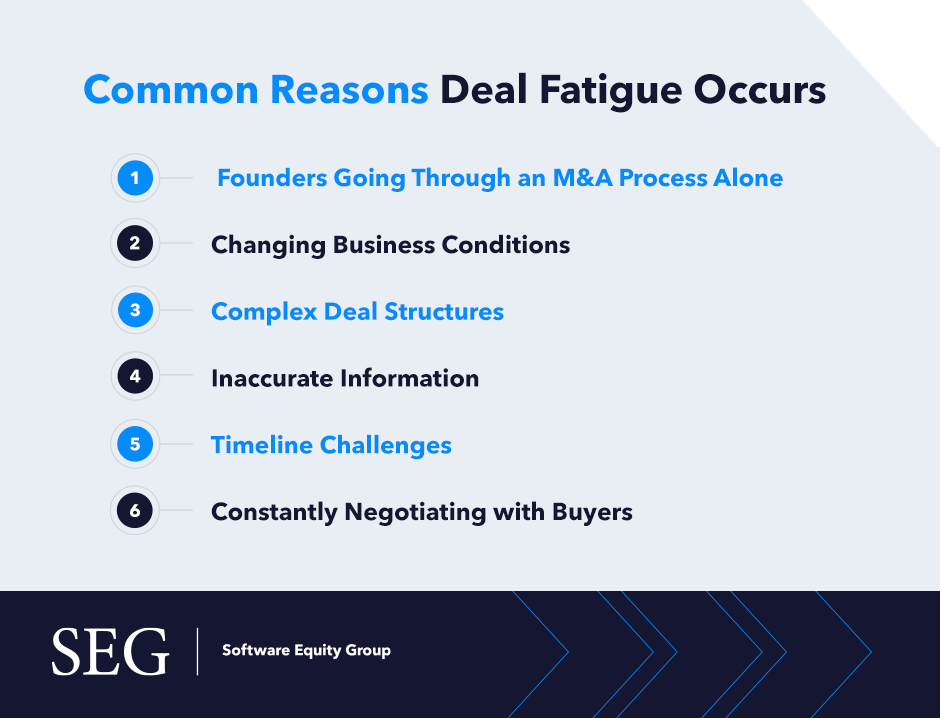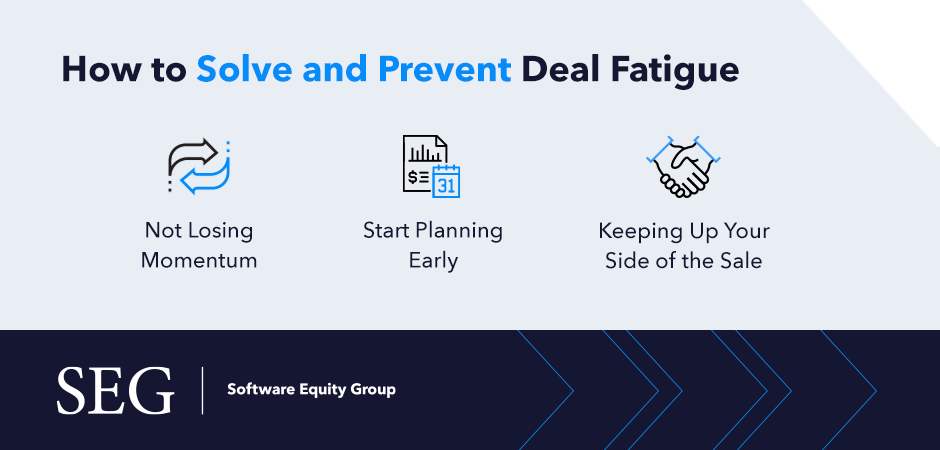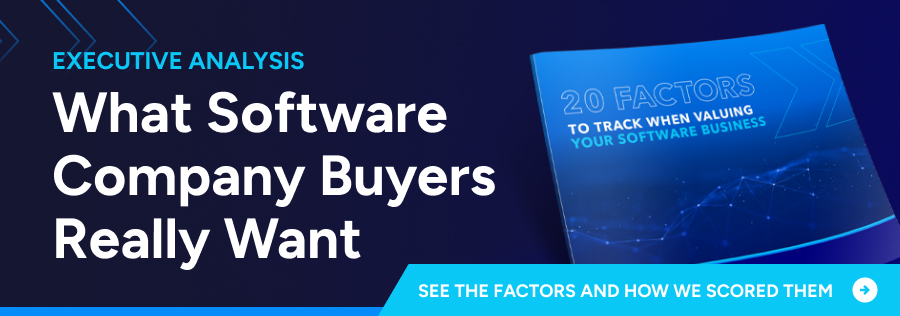What Software Executives Need to Know About Deal Fatigue and How to Prevent It

Selling your software company is intimidating, even for the most experienced. Going through a merger and acquisition (M&A) requires extensive knowledge and time, in addition to the immense effort of running the day-to-day operations of your business. Every deal has many variables and moving parts, making it difficult to handle quickly or without assistance. The longer a transaction drags on, the more exhausted buyers and sellers can get.
Sellers are typically deeply emotionally invested in the transaction after spending years working tirelessly to build their company. The M&A process can take a significant mental and emotional toll, leading to deal fatigue. This phenomenon can potentially sink your deal entirely or lead to a sale with unfavorable terms.
Fortunately, there are ways to identify and prevent deal fatigue before it negatively impacts your transaction. Learn what deal fatigue encompasses, its common causes and effects, and the solutions to minimize or avoid this problem so your M&A aligns with your goals.
What is Deal Fatigue?
Going through a transaction can be daunting and grueling. It’s not uncommon for parties on either side to become frustrated, exhausted, or feel helpless during the process. Negotiations may stall or take longer than expected, making you or others worry that the deal will never finalize. These feelings, known as deal fatigue, are a contributing factor in many deals that don’t reach the finish line.
While deal fatigue can happen at any stage of the M&A process, it’s most likely to occur during due diligence. At this point, the letter of intent (LOI) is signed, and sellers have shared critical information about their company with buyers. You’re entering the home stretch and are waiting for buyers to complete a variety of diligence processes and confirm the accuracy of information previously received.
If the buyer discovers unfavorable information about the seller during diligence, or if the seller experiences a negative event during the process, it can drastically change the deal. The buyer can renegotiate the deal’s terms or reduce the transaction’s enterprise value through a re-trade. Or the buyer can decide to pull out of the M&A transaction completely. Dealing with unexpected changes or delays brings an onslaught of emotions and often results in deal fatigue.
Common Reasons Deal Fatigue Occurs
Several factors can complicate the due diligence process and cause deal fatigue, such as:

Founders Going Through an M&A Process Alone
Running an M&A process while managing the daily operation of your software business is a major challenge. Many CEOs and founders simply can’t handle this process by themselves. Between lacking the legal and accounting expertise needed, not knowing the right questions to ask, and having to continue to run their company, executives are at high risk of deal fatigue. Fatigue can lead to errors in shared documents or data, information gaps, or business underperformance due to lack of focus. These aspects can end up delaying or sinking the deal.
Changing Business Conditions
If a deal takes a long time to complete, your business conditions may change. For example, you may lose key employees or customers, fail to meet financial projections, or the market conditions can shift. Any change can create additional negotiations and stretch out the transaction, contributing to deal fatigue.
Complex Deal Structures
The more complex your deal structure is, the longer due diligence takes. There may be more details the buyer will want to negotiate. They may also call in experts or specialists for advice on your industry or business, prolonging the process.
Inaccurate Information
A deal requires the seller and buyer to exchange material information. If either party presents incomplete or inaccurate information, it draws out the due diligence process and any negotiations. It also creates distrust between the parties who knowingly or unknowingly withheld information.
Timeline Challenges
Sellers who don’t include a due diligence timeline or specific benchmarks in the deal may experience deal fatigue. Without a detailed timeline and mutually working on the game plan, the transaction can halt. Miscommunication between participants or delay tactics by the buyer to gain better terms can increase stress and fatigue. All parties must be held accountable throughout the transaction.
Constantly Negotiating with Buyers
Buyers experienced in M&As will use negotiations to their advantage. They typically have a dedicated team to run the process that focuses exclusively on negotiating transaction terms. If buyers find concerning information during due diligence, they may try renegotiating key points like price, terms, or the overall deal structure. Even if this isn’t the case, buyers may repeatedly go back and forth with sellers over minor details, hoping to wear down the seller’s resolve.
Consequences of Deal Fatigue
Getting the due diligence process right needs to be a top priority for both the buyer and seller. When participants experience deal fatigue, one of the following scenarios could play out:
The Seller Makes Compromises
If the seller is fatigued and just wants to move the sale through, they may compromise on their original deal and accept a less attractive offer. This includes specific terms of the deal, like the amount of cash the seller receives upon closing or important legal details. While this is not an ideal scenario, it’s a better solution than having the transaction fail.
The Deal Falls Through
Deal fatigue can cause a buyer or seller to dig in on certain terms of the sale. If neither party is willing to compromise or able to continue negotiations, the deal may fall through. When the sale stalls indefinitely or there is no positive way to move forward in the process, sometimes the only remaining option is to end the deal.
How to Prevent Deal Fatigue
The best way to solve deal fatigue, or prevent it from the beginning, is by working with an M&A advisor. Having experts on your side gives you a better understanding of the process. Working with an advisor helps minimize risks and avoid costly mistakes during your deal. They know the steps you need for a successful sale and can take on all responsibilities so you aren’t overwhelmed while running your day-to-day operations.
Our advisors at SEG, for example, handle all communication matters and monitor the buyer’s consumption of materials. We aren’t afraid to push back if delays occur and maintain regular status updates to keep your transaction on track. Our M&A team uses their experience to advocate for the seller in every deal.
Besides working with an advisor, other solutions to deal fatigue include:

Not Losing Momentum
It’s critical to keep the momentum going with your deal. Having a due diligence checklist and timeline is one solution. Sticking to the schedule is necessary to thwart deal fatigue, re-trades, or buyers backing out of the transaction.
Start Planning Early
Whether partnering with advisors or not, sellers need to begin planning for due diligence as soon as they start planning an exit strategy. This time is necessary for preparing documentation, identifying and resolving any issues, and positioning your company for the sale. You don’t want to be surprised by problems the buyer finds later on. Not planning for due diligence leads to delays at best and unfavorable terms, a re-trade, or a collapse of your deal at worst.
Keeping Up Your Side of the Sale
As the seller, it’s also important to stick to all details of your agreement to meet deadlines and prevent delays during the sale. This includes responding to requests from the buyer promptly. You also need to hold the buyer accountable, ensuring they adhere to deadlines set in the LOI.
Work With SEG M&A Experts
Our M&A experts help you navigate through new territory during the entire process. We offer the support you need to stay level-headed and cross the finish line of your transaction with ease. Our advisors advocate on your behalf, using our experience to achieve a sale based on your personal and business objectives.
If you’re experiencing deal fatigue, or want to prevent it from occurring during your transaction, contact our team to help guide your sale.










